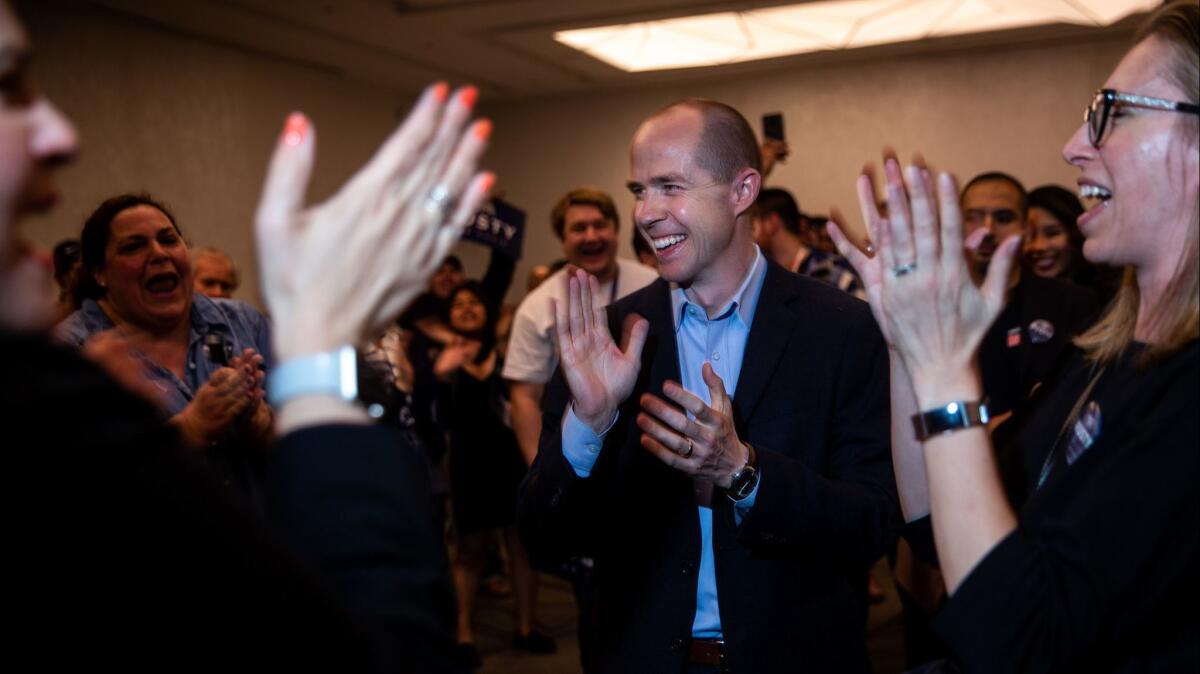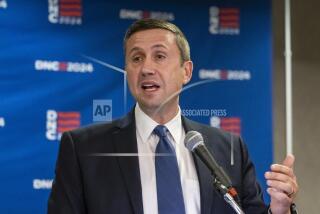California Democratic Party elects new chair to lead an organization pushing further left

- Share via
Reporting from San Francisco — Labor leader Rusty Hicks was elected the next chairman of the California Democratic Party, a win cemented by support from many elected officials and most of the state’s major labor organizations, who hope he can steer the party out of an internal crisis in time for the 2020 elections.
At the state party convention, Hicks, the president of the Los Angeles County Federation of Labor, bested Bay Area activist Kimberly Ellis, who finished second in balloting late Saturday. He will succeed former party Chairman Eric Bauman, who resigned last year after a series of sexual harassment allegations.
With 57% of the vote, Hicks dominated the race. Ellis, who lost to Bauman by just a few dozen votes two years ago, received 36% of the vote while Daraka Larimore-Hall, the party’s vice chairman, trailed with just 6%.
Speaking to supporters at the W Hotel in downtown San Francisco, Hicks, a Texas native and Afghanistan war veteran, said he was “reporting for duty.”
“Coming out of the labor movement, I believe in the collective. I don’t believe in the individual,” Hicks said with more than a dozen elected officials standing behind him. “In order to see a change in the White House, we’re going to have to have a real change in the California Democratic Party, and that starts with us standing together tonight.”
Hicks, 39, has been praised by his backers as a skilled political strategist and a steady, even-keeled leader in the labor movement. He served as political director for the Los Angeles County Federation of Labor under Maria Elena Durazo, rising to president after she was elected to the state Senate in 2018.
Party insiders said Hicks’ victory is the first step toward stabilizing the organization, preparing it for the March presidential primary and to help oust President Trump.
“There’s a deep breath of relief from Democrats who are happy that the party is going to be in good hands and have a strong chair that can help fulfill the party duties,” said Doug Herman, a Democratic consultant who was supporting Hicks. “It’s a direct reflection of the fact that Rusty represented stability and the course that the party delegates were looking for and that the party needs.”
Hicks’ election is considered a victory for many in the party establishment, particularly elected officials who had expressed reservations about Ellis’ platform. Her support of publicly financed elections raised concerns among leaders that she would further limit corporate donors or ban them altogether, a move that could handicap the party financially.
“Whoever is the chair of the party is also the banker,” said Kevin de León, who was state Senate president pro tem in 2017 when Ellis narrowly lost her first race, ran for U.S. Senate last year against fellow Democrat Sen. Dianne Feinstein and is now running for Los Angeles City Council. “You’re not just the voice or the face [of the party], but you have to be trusted with a tremendous amount of resources.”
Subscribe to the Los Angeles Times 2020 election calendar feed »
De León said he “had some concerns” when Ellis ran two years ago and decided to endorse Hicks, a longtime friend, in this year’s race, adding that he called delegates to lobby them to support him.
Assembly Speaker Anthony Rendon (D-Lakewood), who had declined to endorse a candidate in the race, celebrated with Hicks on Saturday night, saying, “The two words that are important tonight are ‘Rusty Hicks.’”
It was a deflating loss for supporters of Ellis, whose campaign had centered on driving a more progressive agenda to inspire women, people of color and younger voters.
“They are looking for something more than just a machine that elects Democrats,” Ellis said in an interview during the campaign. “They’re looking for a place where they can dedicate their time, treasure and talent toward advancing their shared values.”
Ellis would have been the first woman to lead the state party in more than 30 years and the first black woman to chair the organization. During the campaign, she adopted a favorite saying of the late New York Rep. Shirley Chisholm, the first black woman elected to Congress — “If they don’t give you a seat at the table, bring a folding chair.”
Ellis conceded early Sunday morning in a Facebook post, congratulating Hicks and thanking her supporters.
“Certainly, there are challenges for us ahead, and I hope our new chair can bring harmony to our Party during these difficult times,” she wrote.
Some said the vote represented a missed opportunity for the party to show it embraces new voices and takes issues of diversity and representation seriously.
“If I, as a young black woman in this party, can’t see myself in leadership, then what’s the point?” said Dallas Fowler, a delegate from Los Angeles and an Ellis supporter. She pointed out that the California Republican Party recently elected Jessica Patterson to lead the organization, the first woman and the first Latina to hold the post.
“This is a majority-minority state, and until our party really shows up and puts our money and our time and our muscle behind these communities … we’re not going to see that,” Fowler said.
Hicks’ victory comes on the heels of a campaign that centered on how best to steer the party forward after months of turmoil.
In November, after several state party staff members and activists accused Bauman of unwanted touching and making crude sexual comments, he resigned as chairman. The state party now faces three lawsuits alleging discrimination and retaliation in addition to allegations that party leaders ignored Bauman’s alleged misconduct. An attorney for Bauman said he denies the claims in the lawsuits.
Hicks said his top priority will be enacting policies to restore the party’s credibility, including implementing a “zero tolerance” policy on sexual harassment.
“We have to put in not only the culture that says that this is no longer tolerated, but also the systems that ensure that it never happens again,” Hicks told reporters. “We have to have a system in which complaints can actually be lodged, that they are investigated by a third party and that we take clear and decisive action.”
Hicks said he has plotted out a plan for his first 100 days as party leader, including increasing efforts to train grass-roots activists and to reach out to conservative and moderate areas of California, including the Central Valley.
He has spoken frequently about orienting the party more toward addressing issues important to the millions of Californians who are registered as Democrats rather than the select thousands who make up its fiercest activist ranks.
“We should embrace the passion that comes into the party, and also remember what our party is singularly focused on — and that’s seeing a change in the White House in 2020,” Hicks said.
But some left-leaning activists are worried that Hicks’ centrist pitch would chafe against their goals.
“I am deeply afraid that Rusty will shiv us in the back on climate,” said RL Miller, chairwoman of the party’s Environmental Caucus, who spent the weekend pressing presidential candidates to sign a pledge that they wouldn’t take campaign money from oil companies.
On Sunday morning, the final day of the convention, Hicks told delegates that his first order of business would be to help the party recover from what he described as a “contentious campaign.”
“I know some of you in this hall did not vote for me. You voted for another candidate, and I respect that and appreciate that. I want to let you know that this is your party, too,” Hicks said, triggering shouts of “Go, Kimberly!” from the crowd.
Sunday also featured pitches from the final batch of Democratic presidential contenders who descended on the Bay Area over the weekend to win over party activists.
The crowd, which had thinned out after its marathon session the day before, warmly greeted Vermont Sen. Bernie Sanders, who maintains a strong base of support from his 2016 presidential run.
Sanders unleashed an implicit attack on former Vice President Joe Biden, the front-runner, who did not attend this weekend’s confab. Lashing out at Biden’s pledge to bridge partisan divides, Sanders argued that the path to victory does not include finding “middle ground” on issues such as climate change and immigration.
“In my view, we will not defeat Donald Trump unless we bring excitement and energy into the campaign and unless we give millions of working people and young people a reason to vote,” Sanders said.
Former U.S. housing secretary Julian Castro, meanwhile, spoke about law enforcement accountability, teasing a forthcoming plan on police conduct reform and reciting the names of minorities killed by police officers.
For a second day, convention delegates showed their left-leaning inclinations, drowning out Maryland Rep. John Delaney when he described “Medicare for All” — a proposal to expand the availability of healthcare — as bad policy and politics.
Straining to be heard over the loud and prolonged booing, Delaney told them, “This is a battle of ideas, my friends.”
Times staff writers Mark Z. Barabak and Melanie Mason contributed to this report.
More to Read
Get the L.A. Times Politics newsletter
Deeply reported insights into legislation, politics and policy from Sacramento, Washington and beyond. In your inbox twice per week.
You may occasionally receive promotional content from the Los Angeles Times.











